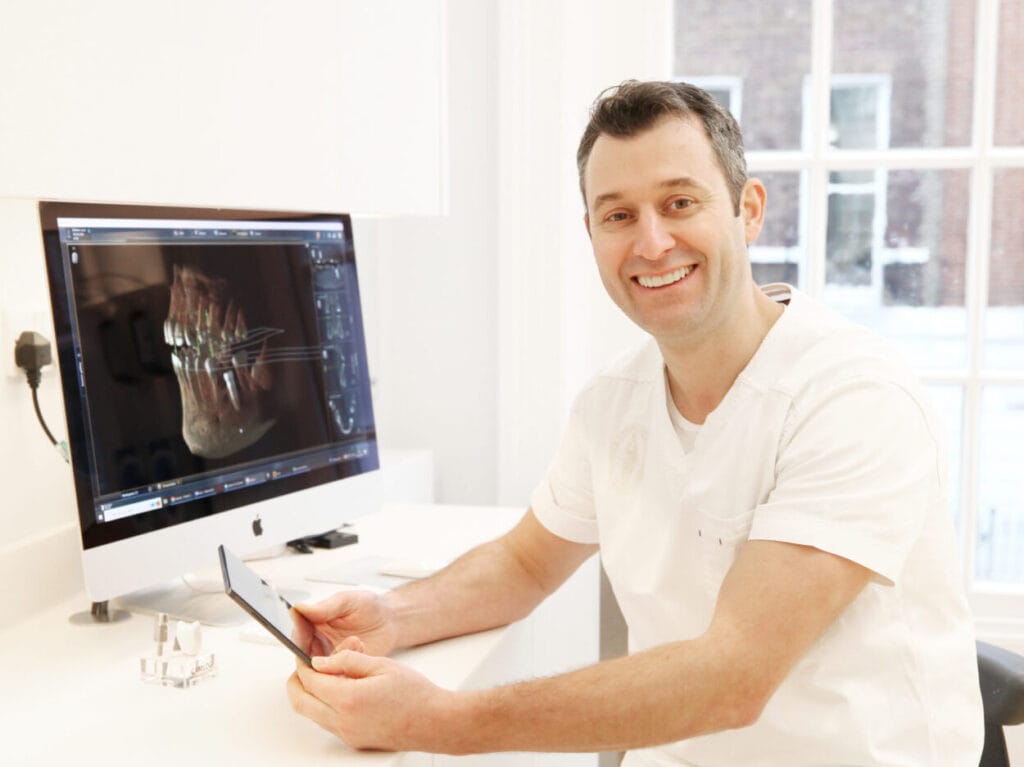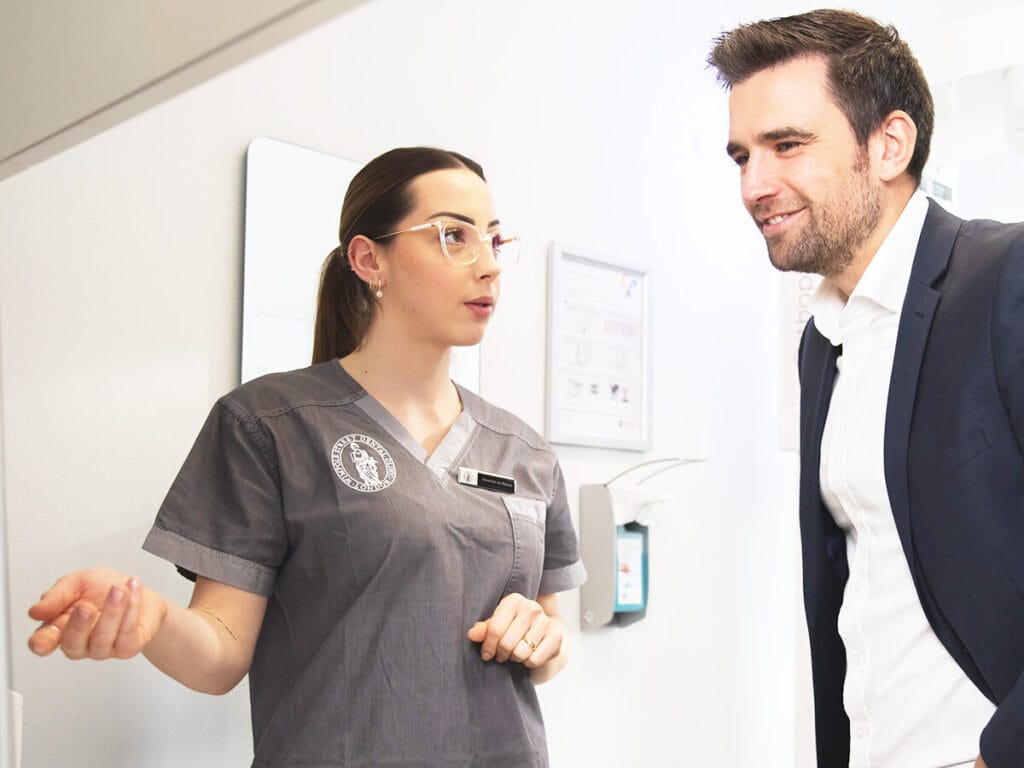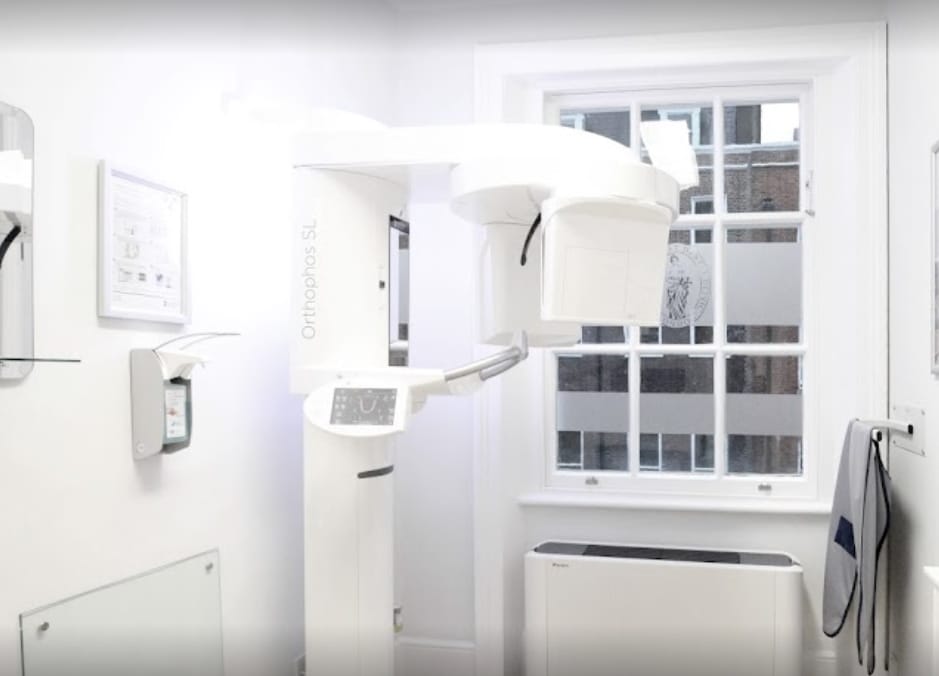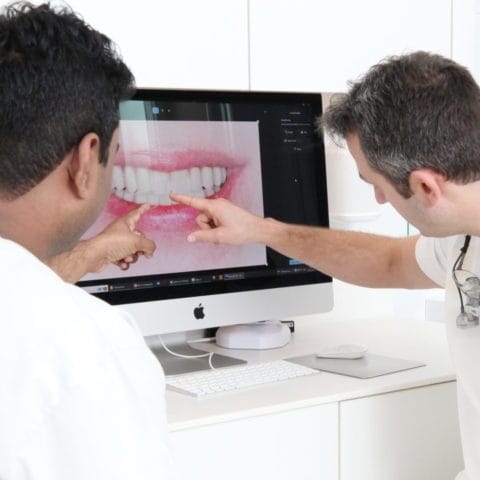Peri-implantitis in London
Peri-implantitis or ‘peri-implant disease’ is a condition where dental implants are affected negatively by a build up of bacteria that starts to cause discomfort and leads to infection and subsequently bone loss. Peri-implantitis usually manifests itself when bacteria or food debris gets lodged or stuck on an implant.

Treatment Duration
30 mins - 5 hours

Price
Dependent on case

Recovery Time
1 - 14 Days

This accumulation causes plaque to appear and harden (which in turn attracts further plaque). This reacts with the soft tissue around the implant, such as gums, and symptoms such as swelling or bleeding when brushed can start to appear. If left untreated, the gum can start to detract from the implant and the infection can spread to the bone. Peri-implantitis is the “gum-disease” teeth that usually have only this time affecting implants.
Once the infection has reached the bone, this can weaken the point where the dental implant and bone are connected, ultimately loosening it entirely.
Patients who suspect they might have peri-implantitis disease should immediately seek the advice of their dentist so that a dentist can properly assess that it is indeed peri-implantitis and undertake a course of action. Treatment for peri-implantitis might range from a course of antibiotics and thorough dental hygiene to surgical cleaning of the implant or even removal of the implant.
Who is suitable for peri-implantitis treatment?
Patients with suspected peri-implantitis are patients with dental implants that report common symptoms such as: bleeding, pus, throbbing pain, redness, inflammation and swelling of the gum, difficulty chewing food, a loosening of the implant, in rare cases abscesses sometimes associated with fever.
Catching peri-implantitis early will give you the best chance of avoiding further surgery and implant failure. Additionally, if you start to experience any of these symptoms following dental implant surgery, please contact your dentist to arrange a check-up so that we minimise any further complications and avoid early implant failure.
Meet your award-winning Peri-implantitis dentist and team…
- We have over 75+ years of combined dentistry experience across our specialist team.
- 10,000+ treatments performed and counting.
- We are leaders in the dental industry – we regularly teach, lecture and publish our research work internationally.
Our Expertise
Whether you’re a confident or nervous patient, our friendly and experienced dentistry team here will always work hard to create a calm and relaxing environment so you can remain confident of our experience. Our recently refurbished dental clinic is conveniently located in central London and provide a calm and welcoming atmosphere to patients new and old.
Our dental team are experienced and knowledgeable in not just dental implantology but all forms of general and cosmetic dentistry and will be able to spot the signs of peri-implantitis from a simple oral inspection of your mouth, teeth and implant. They will be able to assess the severity of the infected implant and be able to recommend the best course of action to avoid a complete dental implant failure.
Our hygienist team will be able to advise on improving your oral hygiene routine so as to avoid further complication or diseases like peri-implantitis or gum disease in the future. Regular brushing, flossing, attending checkups and keeping a close eye on your implant can help reduce risk factors, avoid future inflammation and minimise the need for additional treatment on your implant.

Helen Li
Wimpole Street Dental has the highest most ethical standard of work, personable approach, clear and safe procedures, top notch excellence and reliability in treatment provided with utmost professionalism from crème de la crème world class specialists all under one roof.
What happens during peri-implantitis treatment?
Peri-implantitis treatment is relatively self-explanatory. The infection has to be removed as soon as possible to avoid damage to the dental implant and bone loss. In rare cases a simple course of antibiotics treatment and a non-surgical periodontal cleaning could be enough to remove the infection and protect the dental implants. However, if the infection has spread to the bone and/or already damaged the bone-dental implant connection then it might be necessary to surgically clean the dental implant with a peri-implant surgery.
Peri-implantitis treatment is undertaken by a dentist.




New page design
Written by: Prof Dr Christian Mehl
Medically reviewed by: Dr Raul Costa
Author biography added
Written by: Prof Dr Christian Mehl
Medically reviewed by: Dr Raul Costa
Original content created
Written by: Prof Dr Christian Mehl
Medically reviewed by: Dr Raul Costa
Wimpole St Dental Clinic has strict sourcing guidelines and relies on peer-reviewed studies, academic research institutions, and medical associations. We avoid using tertiary references. You can learn more about how we ensure our content is accurate and current by reading our editorial policy.
- Pjetursson BE, Heimisdottir K. Dental implants – are they better than natural teeth? Eur J Oral Sci. 2018 Oct;126 Suppl 1:81-87. doi: 10.1111/eos.12543. PMID: 30178552.
- Jepsen S, Berglundh T, Genco R, Aass AM, Demirel K, Derks J, Figuero E, Giovannoli JL, Goldstein M, Lambert F, Ortiz-Vigon A, Polyzois I, Salvi GE, Schwarz F, Serino G, Tomasi C, Zitzmann NU. Primary prevention of peri-implantitis: managing peri-implant mucositis. J Clin Periodontol. 2015 Apr;42 Suppl 16:S152-7. doi: 10.1111/jcpe.12369. PMID: 25626479.
- Cheung MC, Hopcraft MS, Darby IB. Dental Implant Hygiene and Maintenance Protocols: A survey of oral health practitioners in Australia. J Dent Hyg. 2021 Feb;95(1):25-35. PMID: 33627450.









